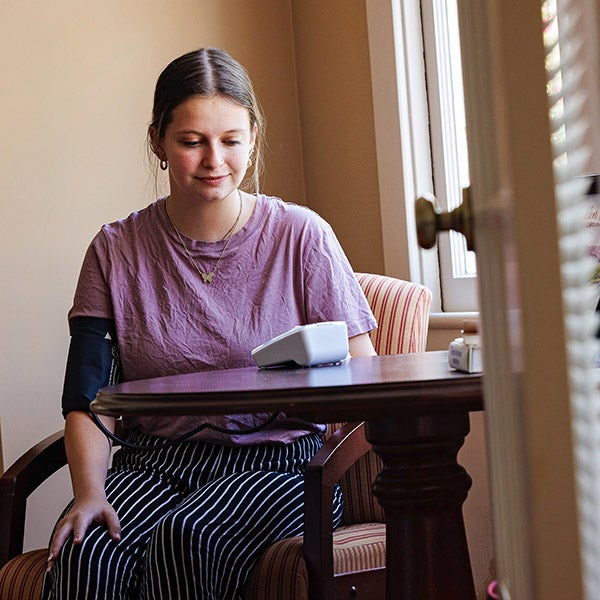ECU leads blood pressure clinical trial using home monitoring, team approach
Researchers at East Carolina University will lead a five-year randomized clinical trial aimed at improving blood pressure control in rural and urban patients using targeted home-based monitoring and telehealth and a health care team approach to blood pressure management.
The $5.6 million, five-year project is made possible by a contract through the Patient-Centered Outcomes Research Institute (PCORI), a nonprofit research organization that is also the leading funder of patient-centered comparative clinical effectiveness research in the United States.
The project, “Carolina Consortium to Improve BP Control in Vulnerable Populations,” is led by ECU’s Dr. Doyle “Skip” Cummings, the Berbecker Distinguished Professor of Rural Medicine, a full professor in public health in the Brody School of Medicine and senior faculty member in the ECU Health Disparities Center.

ECU will lead a five-year randomized clinical trial aimed at improving blood pressure control in rural and urban patients using targeted home-based monitoring. (Photo by Cliff Hollis)
Project partners include UNC–Chapel Hill (including co-PI, Dr. Jacqueline Halladay from UNC Family Medicine), Atrium Health, the University of Alabama–Birmingham (Data Coordinating Center), Cape Fear Clinic in Wilmington, N.C., and numerous other health care partners across the state. The study will also be guided by patient and community stakeholders to optimize patient acceptability of proposed strategies. Many of these partners, including Cummings, have worked together for more than a decade on projects addressing hypertension — a leading yet modifiable cardiovascular risk factor.
Nearly 70 patients in each of 13 practices, a total of more than 900 patients — from western North Carolina to the coast — will take part in the study, which is part of overarching efforts to reduce stroke and cardiovascular risk in North Carolina patients with uncontrolled high blood pressure. Drs. Shivajirao Patil and Jamie Messenger will lead the ECU Family Medicine clinic’s participation.
“The intent is to study how well this new strategy for improving blood pressure control works in high-risk populations compared to usual care,” Cummings said.
That strategy includes two main parts: an ongoing at-home blood pressure monitoring portion of the study and a pro-active health care provider team to provide patient-centered blood pressure management.
“The first part is a much more intensive home telemonitoring of blood pressure in individuals who have a history of uncontrolled blood pressure in the clinic,” Cummings said. “We would be giving the patient a home blood pressure monitoring device that is telehealth-enabled. The readings will be transmitted into a server or site where we will create regular reports that will then go to the provider team. Instead of everything going through one provider, we’re going to try to create a comprehensive team approach to blood pressure management.”
Using that team approach will position the providers to assess patients whose blood pressure has gotten out of control between doctor visits and use medications and lifestyle adjustments to address the problem and reduce the risk of stroke and other cardiovascular events in at-risk patients. The team could include physicians, nurse practitioners, clinical pharmacists and other providers.
“Through partnership with Dr. Lauren Sastre in Nutrition Sciences here at ECU, we’re also going to use a nutritionist and some nutrition graduate students who can help us reach into the homes of these patients who have uncontrolled hypertension and provide additional counseling on dietary behaviors,” Cummings said.
A similar strategy was first used for patients in urban and suburban Minneapolis, Cummings added. The ECU-led project aims to include a more diverse range of patients with more health care challenges.
“We proposed to PCORI that we’d like to see if that same strategy will work in a place like North Carolina, where there are more minority populations, people in more socially vulnerable situations or who have more challenges with insurance coverage, and see if we can make that same strategy work to improve blood pressure control patterns here,” he said. “We’re looking forward to trying it and seeing how well it will work in eastern North Carolina and western North Carolina as well as in urban areas near Charlotte and the middle of the state.”
The project could also reveal how “generalizable” — expandable and applicable — the strategic approach could be to other patient populations as well.
The motivation for the project, Cummings said, came from prior research collaborations on hypertension, including a collaboration through a PCORI contract that Wake Forest was awarded to study hypertension control in elderly patients who had experienced a stroke.
“We were intrigued by this idea that we might be able to leverage this home telemonitoring capability,” he said, “but instead of trying it with people who have already had a stroke or a bad outcome, we want to see if we can do it in primary care before they have those adverse events.”